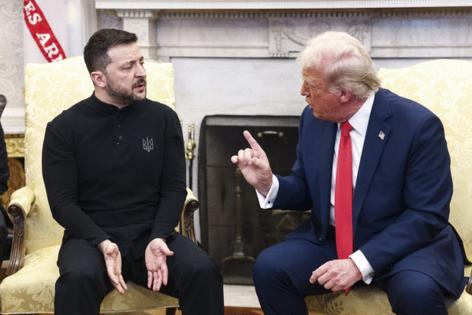Ukraine risks becoming to Trump what Afghanistan was to Biden
Published in News & Features
On the face of it, the U.S. involvement in Ukraine bears little similarity to the 20-year Afghanistan war, not least because there are no American boots on the ground in Europe.
Yet there are similarities for President Donald Trump: resolving the conflict is proving no easy task, and he risks getting shackled with responsibility — and potentially blame — the longer it goes on.
That’s a feeling that has gained more credence as Trump wrestles with how to respond to President Vladimir Putin as he’s stepped up deadly strikes against Ukraine. Trump has been foiled in his pledge to make peace quickly, forcing him to decide whether to get more involved or keep his distance.
Getting sucked into the conflict more deeply would provoke the ire of Trump’s Make America Great Again base. But allowing Russia to make steady gains, while holding off on additional aid, might make him look weak and draw accusations that he didn’t do enough to stop Putin.
“Trump’s been in charge of U.S. policy for almost six months and the war continues, and now it’s on Trump,” said John Herbst, a former U.S. ambassador to Ukraine, who’s now with the Atlantic Council. “He understands that he could get nailed big time if Putin wins on his watch.”
The Afghanistan comparison may seem far-fetched given the fundamentally different nature of the two conflicts. At its high point, the U.S. had 100,000 troops in Afghanistan and nearly 2,500 American military personnel died over the course of the 20-year war. Ultimately the U.S. was unable to stop the Taliban and President Joe Biden got blamed for a U.S. withdrawal — one that Trump laid the groundwork for in his first term.
The U.S. has no troops on the ground in Ukraine, limiting itself to the flow of weapons and materiel. The conflict is in its fourth year and few analysts predict a massive collapse of the Ukrainian government or say Russia would be able to take over the whole country.
Even so, Trump has strenuously sought to distance himself from it, repeatedly saying the war never would have happened on his watch and suggesting he’s not responsible for the outcome.
“It wasn’t my war — it was Biden’s war,” he said at a meeting with NATO Secretary General Mark Rutte earlier this month. “It’s not my war. I’m trying to get you out of it.”
The Afghanistan comparison has slowly filtered into the conversation. Months before Trump won reelection in November, Washington Post columnist Marc Thiessen, a senior fellow at the right-leaning American Enterprise Institute, warned Republicans about the dangers of blocking more aid to Ukraine.
“For Republicans, a time for choosing has arrived: Unless you want to be blamed for the fall of Kyiv the way Biden is blamed for the fall of Kabul, send military aid to Ukraine,” he wrote.
Almost a year later, this past February, Council on Foreign Relations President Michael Froman made the point just as sharply, warning that a hasty deal would be a “grave error” that would also undercut Trump’s desire to be seen as a peacemaker.
“If you thought the optics of the Taliban parading American Humvees through Kabul looked bad, imagine the Russians driving a convoy of Abrams tanks through Kharkiv,” Froman wrote.
Last week, Trump announced a plan to get billions of dollars of U.S. weapons to Kyiv, reversing an earlier pause in supplies, and gave Putin 50 days to agree to a ceasefire or face new sanctions — something allies have been urging for months.
“President Trump wants to stop the killing, which is why he is selling American-made weapons to NATO members and threatening Putin with biting tariffs and sanctions if he does not agree to a ceasefire,” White House spokesperson Anna Kelly said.
The challenge for Trump is that some of his most die-hard MAGA supporters, including ally Steve Bannon, argue exactly the opposite — that deeper U.S. involvement will be Trump’s undoing.
“If President Trump sells them offensive weapons that can strike deep inside of Russia, I don’t see how you avoid it becoming Trump’s war,” Bannon said in an interview. “The media, the Ukrainians, the Russians and the Neocons would all say it’s Trump’s war.”
____
(With assistance from Natalia Drozdiak, Andrea Palasciano, Jennifer A. Dlouhy, Joshua Green, Jamie Tarabay and Alberto Nardelli.)
©2025 Bloomberg L.P. Visit bloomberg.com. Distributed by Tribune Content Agency, LLC.







Comments